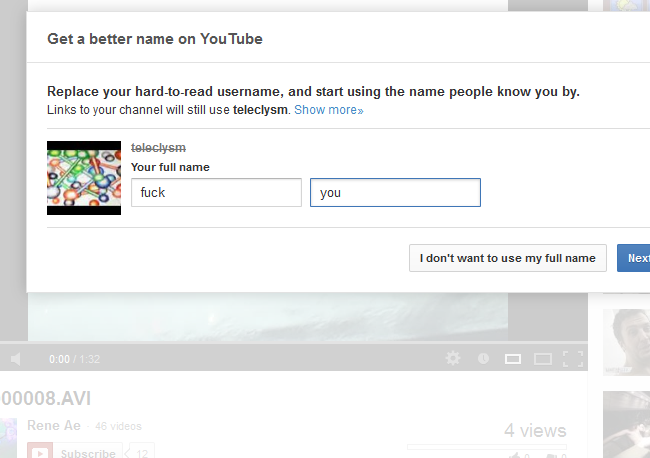
Griped about the above annoying pop-up screen that appeared in my pseudonymous YouTube account back in February. Tried to delete that YouTube account then, but the button wasn't letting me and I put it off.
Reading Julian Assange's blistering New York Times review [Sat, June 1] of the book The New Digital Age, co-written by Google's Eric Schmidt, motivated me to try again. This time it worked -- that account with the "hard to read" name is gone.
A couple of excerpts from the Assange's non-word-mincing review:
The authors offer an expertly banalized version of tomorrow’s world: the gadgetry of decades hence is predicted to be much like what we have right now — only cooler. “Progress” is driven by the inexorable spread of American consumer technology over the surface of the earth. Already, every day, another million or so Google-run mobile devices are activated. Google will interpose itself, and hence the United States government, between the communications of every human being not in China (naughty China). Commodities just become more marvelous; young, urban professionals sleep, work and shop with greater ease and comfort; democracy is insidiously subverted by technologies of surveillance, and control is enthusiastically rebranded as “participation”; and our present world order of systematized domination, intimidation and oppression continues, unmentioned, unafflicted or only faintly perturbed.
and (on cyberterror scare stories promoted by the defense industry and Schmidt):
I have a very different perspective. The advance of information technology epitomized by Google heralds the death of privacy for most people and shifts the world toward authoritarianism. This is the principal thesis in my book, “Cypherpunks.” But while Mr. Schmidt and Mr. Cohen tell us that the death of privacy will aid governments in “repressive autocracies” in “targeting their citizens,” they also say governments in “open” democracies will see it as “a gift” enabling them to “better respond to citizen and customer concerns.” In reality, the erosion of individual privacy in the West and the attendant centralization of power make abuses inevitable, moving the “good” societies closer to the “bad” ones.
The section on “repressive autocracies” describes, disapprovingly, various repressive surveillance measures: legislation to insert back doors into software to enable spying on citizens, monitoring of social networks and the collection of intelligence on entire populations. All of these are already in widespread use in the United States. In fact, some of those measures — like the push to require every social-network profile to be linked to a real name — were spearheaded by Google itself. [emphasis added]
hat tips mashedpo and andrej
(I suppose the reason the Times gave this space to the media's Dr. Evil is they still hate Google for wrecking their business model 10 years ago. --TM)
